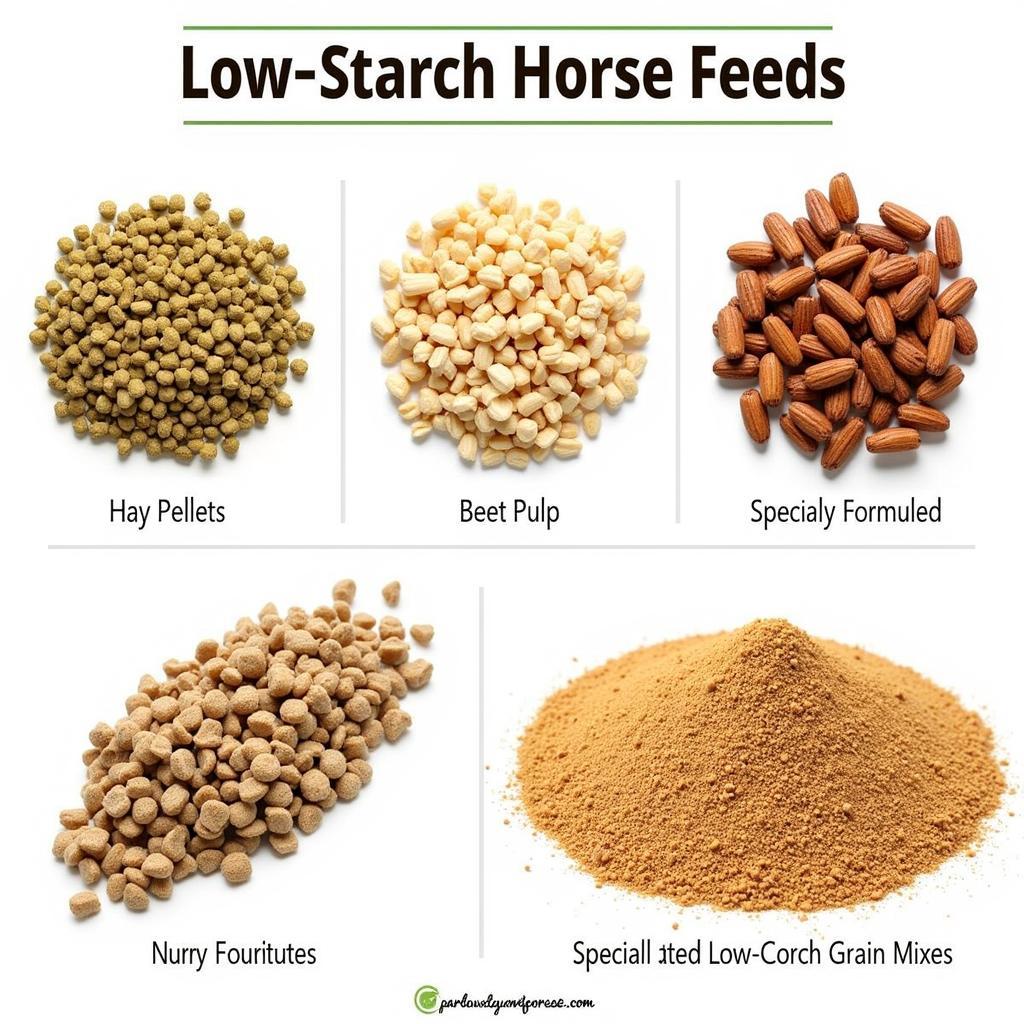Low Starch Horse Feed is becoming increasingly popular amongst horse owners looking to optimize their horse’s health and performance. From metabolic issues to digestive sensitivities, understanding the role of starch in your horse’s diet is crucial for their overall well-being. Choosing the right low starch option can significantly impact your horse’s energy levels, coat condition, and behavior.
Why Choose Low Starch Horse Feed?
Horses are naturally designed to graze on forage, which is naturally low in starch. When we introduce grains and other high-starch feeds into their diet, we can disrupt their delicate digestive system. Too much starch can lead to a range of problems, including colic, laminitis, and insulin resistance. impact senior horse feed may be necessary for older horses with metabolic issues, as they often benefit from a low-starch diet. A low-starch diet, rich in fiber, mimics their natural grazing patterns and supports healthy gut function. This is particularly important for horses prone to digestive upsets or those with metabolic conditions like Equine Metabolic Syndrome (EMS).
 Low Starch Horse Feed Options
Low Starch Horse Feed Options
What Are the Benefits of a Low Starch Diet?
Switching to a low starch diet can offer a multitude of benefits for your equine companion. From improved energy levels to a healthier digestive system, low starch feed can be a game-changer. Here are some key advantages:
- Improved Digestive Health: Fiber-rich, low-starch diets promote a healthy hindgut environment, reducing the risk of colic and other digestive issues.
- Stable Energy Levels: Low starch diets provide a slow-release of energy, avoiding the sugar highs and lows associated with high-starch feeds. This leads to more consistent energy levels throughout the day.
- Reduced Risk of Laminitis: By managing insulin levels, low starch diets can help minimize the risk of laminitis, a painful and debilitating hoof condition.
- Healthier Weight Management: Low starch feeds are often lower in calories, aiding in weight management for horses prone to obesity.
- Improved Coat Condition: A balanced, low-starch diet can contribute to a shiny, healthy coat.
How to Choose the Right Low Starch Horse Feed?
Selecting the appropriate low starch feed depends on several factors, including your horse’s age, activity level, and overall health. Consulting with your veterinarian or an equine nutritionist can provide personalized guidance. Consider these points:
- Forage First: The foundation of any horse’s diet should be high-quality forage, such as hay or pasture.
- Read the Label: Carefully examine the feed label, paying attention to the starch and sugar content. Look for feeds with starch levels below 10-12%.
- Gradual Transition: When switching to a new feed, introduce it gradually to avoid digestive upset.
- Monitor Your Horse: Observe your horse for any changes in behavior, weight, or coat condition after switching to low starch feed.
Do horses enjoy treats like Purina horse treats? Absolutely, but even treats should be chosen carefully to align with a low-starch approach. What about feeding oats to horses? While oats are traditionally fed to horses, they are relatively high in starch and should be fed in moderation, especially to horses sensitive to starch.
“Low starch diets are not a one-size-fits-all approach,” advises Dr. Emily Carter, DVM, equine nutrition specialist. “Understanding your horse’s individual needs is paramount to ensuring they receive the appropriate nutrition.”
 Veterinarian Examining Horse
Veterinarian Examining Horse
Is Low Starch Horse Feed Right for My Horse?
Many horse owners wonder, “What do horses like to eat as a treat?” You can find some ideas at this link: what do horses like to eat as a treat. While treats are important for bonding and rewarding good behavior, prioritizing a healthy, balanced diet is essential. If your horse has metabolic issues or is prone to digestive problems, low starch horse feed is likely a beneficial choice. For more information on specific horse feed brands, check out horse feed nsc. Remember, consulting with a veterinarian is always recommended for personalized advice.
In conclusion, choosing low starch horse feed can significantly improve your horse’s health and well-being. By understanding the impact of starch on your horse’s digestive system and overall health, you can make informed decisions about their dietary needs and help them thrive.
FAQ:
- What is the ideal starch percentage in horse feed?
- Can I feed my horse too much low-starch feed?
- What are the signs of starch overload in horses?
- Are all low-starch feeds the same?
- How can I transition my horse to low-starch feed safely?
- What are some good sources of low-starch forage?
- How do I know if my horse is benefiting from a low-starch diet?
Need help with your horse’s nutrition? Contact us! Phone: 0772127271, Email: [email protected] or visit us at QGM2+WX2, Vị Trung, Vị Thuỷ, Hậu Giang, Việt Nam. We have a 24/7 customer support team.